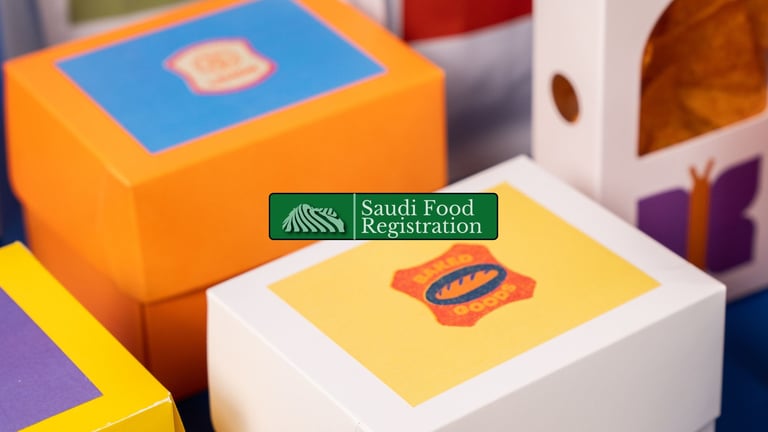Food Packaging SASO Certification
Get SASO certification for food packaging in Saudi Arabia with Saudi Food Registration. Ensure SFDA compliance, meet safety standards, and expand market access.
2/10/20254 min read


Navigating SASO Certification:
A Comprehensive Guide for Food Packaging Compliance in Saudi Arabia
In the complex world of food packaging and distribution, understanding Saudi Arabia's stringent regulatory landscape is crucial for businesses looking to enter or expand in the market.
SASO certification isn't just a bureaucratic requirement—it's your passport to successfully operating in one of the Middle East's most dynamic food markets.
What is SASO Certification & Why is It Critically Important?
SASO (Saudi Standards, Metrology, and Quality Organization) is the kingdom's premier regulatory body ensuring product safety and quality.
For food packaging and contact materials, SASO certification represents a non-negotiable seal of approval that protects consumer health and maintains rigorous safety standards.
Compliance isn't optional—it's mandatory.
Non-compliance can result in severe consequences:
✅ Substantial financial penalties
✅ Product shipment rejections
✅ Potential import bans
✅ Damage to brand reputation
Who Needs SASO Certification?
SASO certification applies to a broad range of businesses involved in food packaging:
🔹 Food Manufacturers – Companies producing packaging that directly contacts food products.
🔹 Importers and Distributors – Businesses bringing packaging materials into Saudi Arabia.
🔹 Retailers and Supermarkets – Ensuring packaged food meets Saudi safety regulations.
🔹 Kitchenware Suppliers – Vendors selling food-contact materials like utensils and storage containers.
Comprehensive SASO Certification Requirements
To achieve SASO certification, businesses must comply with strict regulations covering:
Material Safety Compliance
Harmful substances banned – Packaging materials must be free from harmful chemicals like BPA, lead, and phthalates to prevent contamination and ensure consumer safety. – No BPA, heavy metals, or toxic additives.
Food-grade quality required – All packaging materials must meet stringent food safety standards, ensuring they do not alter the taste, odor, or composition of food products. – Packaging must be safe for direct food contact.
Migration testing – Packaging undergoes scientific testing to confirm that no toxic chemicals transfer from the material to the food, maintaining health and safety compliance. – Ensuring no transfer of harmful chemicals to food.
Packaging Labeling Regulations
Mandatory Arabic translations – Labeling must be accurately translated into Arabic, ensuring consumers can read and understand product details, usage instructions, and safety warnings. – Labeling must follow SFDA & SASO guidelines.
Precise product information – Labels must include key details such as product composition, manufacturer information, expiration dates, and storage recommendations to ensure full transparency. – Clear ingredients, warnings, and manufacturer details.
Tamper-proof & traceability features – Packaging must incorporate security seals and traceability codes to prevent tampering and allow tracking throughout the supply chain. – Ensuring consumer safety and authenticity.
Sustainability Considerations
Recyclable & eco-friendly materials encouraged – Businesses are encouraged to adopt biodegradable or recyclable packaging solutions to align with Saudi Arabia’s increasing sustainability initiatives. – Compliance with emerging sustainability regulations.
Waste management guidelines – Proper disposal and recycling practices must be followed, with packaging designed to minimize environmental impact and waste accumulation. – Packaging must adhere to Saudi environmental standards.
Rigorous Testing Protocols
Comprehensive laboratory analysis – Packaging undergoes physical, chemical, and microbiological testing in SASO-approved labs to verify compliance with Saudi safety standards. – SASO-approved labs validate safety and compliance.
Food contact material assessments – Specialized tests evaluate how packaging interacts with different food types, ensuring no alteration in food quality or safety. – Ensuring packaging doesn’t compromise food quality.
Compliance with international safety standards – SASO aligns its regulations with global benchmarks such as ISO and FDA standards, ensuring international compatibility for exports. – SASO aligns with global food safety benchmarks.
The SASO Certification Journey: A Step-by-Step Process
🔹 Step 1: Scope Determination – Identify applicable SASO regulations for your packaging materials.
🔹 Step 2: Comprehensive Testing – Conduct laboratory assessments to validate compliance.
🔹 Step 3: Documentation Preparation – Compile safety data sheets, packaging specs, and compliance reports.
🔹 Step 4: Regulatory Audit – Undergo inspection by SASO or an accredited certification body.
🔹 Step 5: Certificate Acquisition – Receive official SASO certification upon successful evaluation.
Overcoming Common SASO Certification Challenges
Challenge: Material Composition Compliance
🔹 Issue: Some packaging fails to meet SASO’s strict safety standards.
🔹 Solution: Work with SASO-approved testing laboratories and source from certified suppliers.
Challenge: Packaging Labeling Precision
🔹 Issue: Incorrect labeling leads to product rejection.
🔹 Solution: Use professional Arabic translation services and cross-check regulatory guidelines.
Challenge: Certification Timeline Management
🔹 Issue: Delays in certification approval.
🔹 Solution: Start compliance checks early and engage experienced regulatory consultants.
Financial and Timeline Considerations
Timeline Expectations: The SASO certification process typically takes 4-8 weeks, though complex applications may take longer.
Cost Factors: Testing fees, certification body fees, documentation translation, and compliance adjustments contribute to costs.
How Saudi Food Registration Streamlines Your Certification
Our specialized services ensure a smooth SASO certification process, minimizing delays and compliance risks:
✅ Preliminary compliance assessments to determine certification requirements.
✅ End-to-end documentation review for accuracy and compliance.
✅ Laboratory testing coordination with SASO-approved labs.
✅ Full application management for hassle-free certification.
✅ Regulatory consulting to prevent unexpected certification rejections.
Related Reads
ISO 22000 Certification in Saudi Arabia – A guide to food safety management systems and regulatory compliance. – How Good Manufacturing Practices impact packaging compliance.
Understanding SFDA’s Packaging and Labeling Regulations – Key compliance steps for food packaging in Saudi Arabia. – A complete guide to compliant labeling in Saudi Arabia.
How to Ensure Compliance with Saudi Arabia’s Packaging Waste Regulations – Best practices for sustainable food packaging. – Understanding sustainability rules for food packaging.
Learn how BRCGS certification boosts food safety and market access in Saudi Arabia.
At The End:
SASO certification is more than a regulatory formality—it's a gateway to market success in Saudi Arabia.
By ensuring compliance with SASO's stringent requirements, businesses can strengthen brand trust, expand market access, and avoid costly regulatory penalties.
Need expert guidance?
Contact our team today or use our chatbot in the bottom right corner for immediate assistance!
